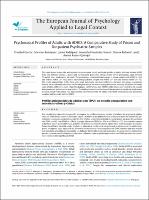Psychosocial Profiles of Adults with ADHD: A Comparative Study of Prison and Outpatient Psychiatric Samples
Resum
Paraules clau
TDAH; Presó; Pacients psiquiàtrics ambulatoris; Conseqüències legals
Citació recomanada
García T, Rodríguez C, Rodríguez J, Fernández-Suárez A, Richarte V, Ramos-Quiroga JA. Psychosocial profiles of adults with ADHD: A comparative study of prison and outpatient psychiatric samples. Eur J Psychol Appl to Leg Context. 2019;11(1):41-9.
Audiència
Professionals
Empreu aquest identificador per citar i/o enllaçar aquest document
https://hdl.handle.net/11351/5837Aquest element apareix a les col·leccions següents
- HVH - Articles científics [2952]
Els següents fitxers sobre la llicència estan associats a aquest element:

